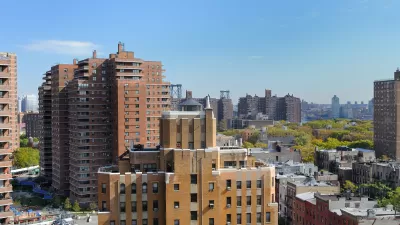Interview with the co-author of the report "Social Housing in the United States," on the politics of home ownership, why public housing needs to be mixed-income, and providing adequate, affordable housing to all citizens.

That today is the time to fight for public housing is the argument of “Social Housing in the United States,” a new report published by the People’s Policy Project, an independent think tank. With half of the rental population facing the prospect of being rent-burdened, and with fewer than 1 in 3 of the 9 million families foreclosed on during the recession likely to purchase homes again, something clearly must change in the way we approach housing and shelter.
I spoke with Ryan Cooper, co-author of the report (with Peter Gowan), about current approaches to government intervention in the rental market, the politics of home ownership, why public housing needs to be mixed income, and what we can envision from a society that provides adequate, affordable housing to all of its citizens.
Tanner Howard: How does the Low-Income Housing Tax Credit [LIHTC] reflect the shortcomings of our current approach to private housing as an affordable housing solution? What could the money that’s going to it and programs like it, specifically New York and its massive tax offsets, be doing in the short-term if it were to be reinvested in public housing?
Ryan Cooper: The main characteristic of these kind of tax break-style of things is that it seems clear that in every circumstance, it’s much less efficient to try to coax the private market into doing what you want, rather than just doing it yourself.
A clear example was the Obama administration’s approach to foreclosure policy, when they decided they’d...
FULL STORY: It’s Time to Build New, Mixed-Income Public Housing

Maui's Vacation Rental Debate Turns Ugly
Verbal attacks, misinformation campaigns and fistfights plague a high-stakes debate to convert thousands of vacation rentals into long-term housing.

Planetizen Federal Action Tracker
A weekly monitor of how Trump’s orders and actions are impacting planners and planning in America.

Chicago’s Ghost Rails
Just beneath the surface of the modern city lie the remnants of its expansive early 20th-century streetcar system.

Bend, Oregon Zoning Reforms Prioritize Small-Scale Housing
The city altered its zoning code to allow multi-family housing and eliminated parking mandates citywide.

Amtrak Cutting Jobs, Funding to High-Speed Rail
The agency plans to cut 10 percent of its workforce and has confirmed it will not fund new high-speed rail projects.

LA Denies Basic Services to Unhoused Residents
The city has repeatedly failed to respond to requests for trash pickup at encampment sites, and eliminated a program that provided mobile showers and toilets.
Urban Design for Planners 1: Software Tools
This six-course series explores essential urban design concepts using open source software and equips planners with the tools they need to participate fully in the urban design process.
Planning for Universal Design
Learn the tools for implementing Universal Design in planning regulations.
planning NEXT
Appalachian Highlands Housing Partners
Mpact (founded as Rail~Volution)
City of Camden Redevelopment Agency
City of Astoria
City of Portland
City of Laramie





























